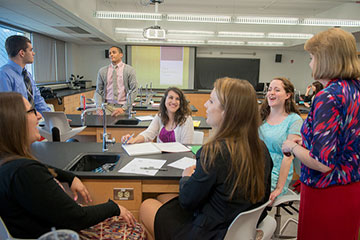
04/18/2017
Timothy Duerr, a SUNY Cortland senior biology major from Massapequa, N.Y., is hungry for the chance to study research scholarship.
Through the Student Government Association, he founded the new student club Current Research in Biology (CRIB) to expose students to novel research that is currently being conducted in laboratories across the world.
The club meets Thursdays at 5 p.m. in the Bowers Hall lounge.
With approximately 30 members, the journal club format allows members to learn about literature and analyze it together.
In graduate school or medical school, journal clubs focus on getting a piece of literature and figuring out what techniques to use to edit a research project, Duerr said. He wants undergraduate students to get that exposure.
“This is all about directly educating students,” Duerr said. “To do this as a group is really beneficial, and helps everyone get the most out of the readings.”
The club has numerous guest speakers visit and talk about their research. During the month of February, Stephen J. Glatt, an associate professor of psychiatry and behavioral sciences, neuroscience and physiology at SUNY Upstate Medical University, gave a talk about “Biomarkers for Neuropsychiatric Disorders.”
The presentation — hosted by CRIB, the Biology Club, and the Tri-Beta biology honor society — summarized the latest efforts to identify valid biomarkers for these disorders, which could lead to earlier identification and intervention.
“To see these people talk about their projects and express their passions really expands our experience,” said Duerr.
CRIB also hosted Rebecca Pinder, an adjunct science instructor at Columbia-Greene Community College who has focused her scholarship on an invasive species of earthworms, to present her research as well as discuss her career as an academic scientist.
“It’s not just reading the literature, but being able to see first-hand a person presenting their research who has the power to potentially change something,” Duerr said.
The club also hopes to foster academic growth among its members by giving them the chance to network with faculty from outside universities and talk with people they could be interacting with in their higher education pursuits.
The club membership hopes to eventually expand its network and begin collaborating with surrounding Central New York schools such as Binghamton University and Syracuse University to form a larger undergraduate journal group.
For more information, contact Duerr.
Prepared by Communications Office writing intern Jessica Haverlin